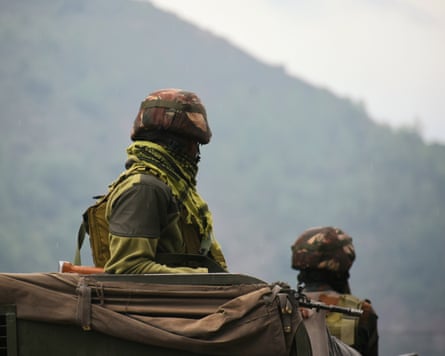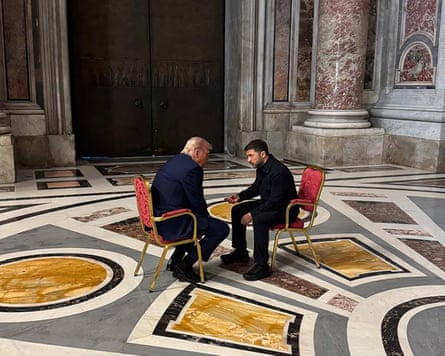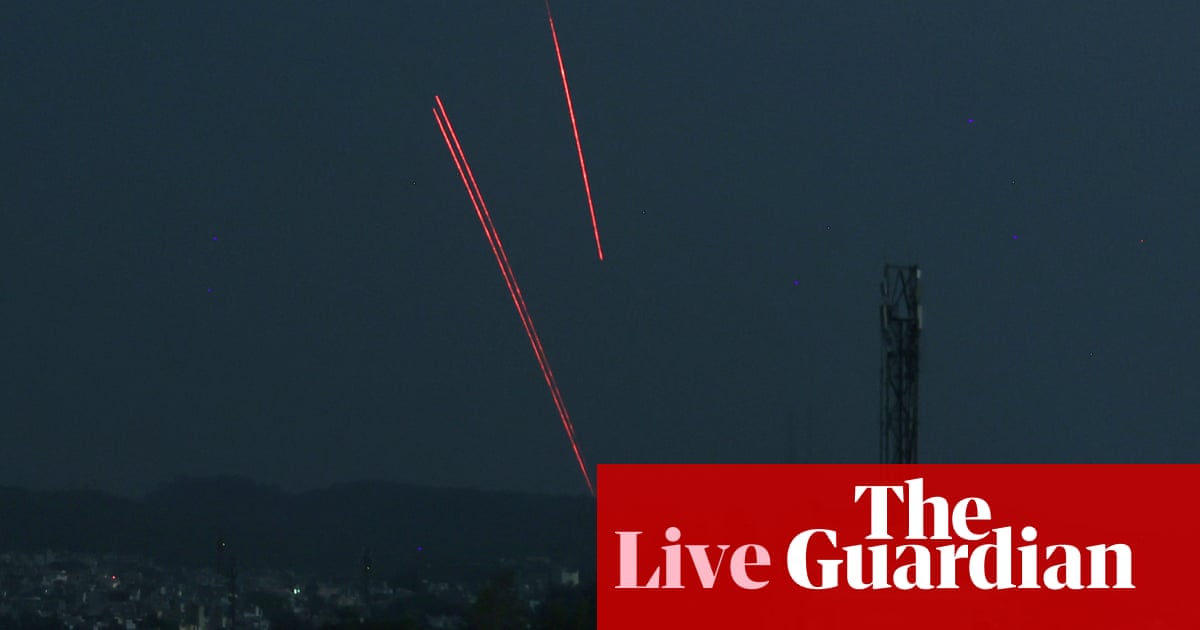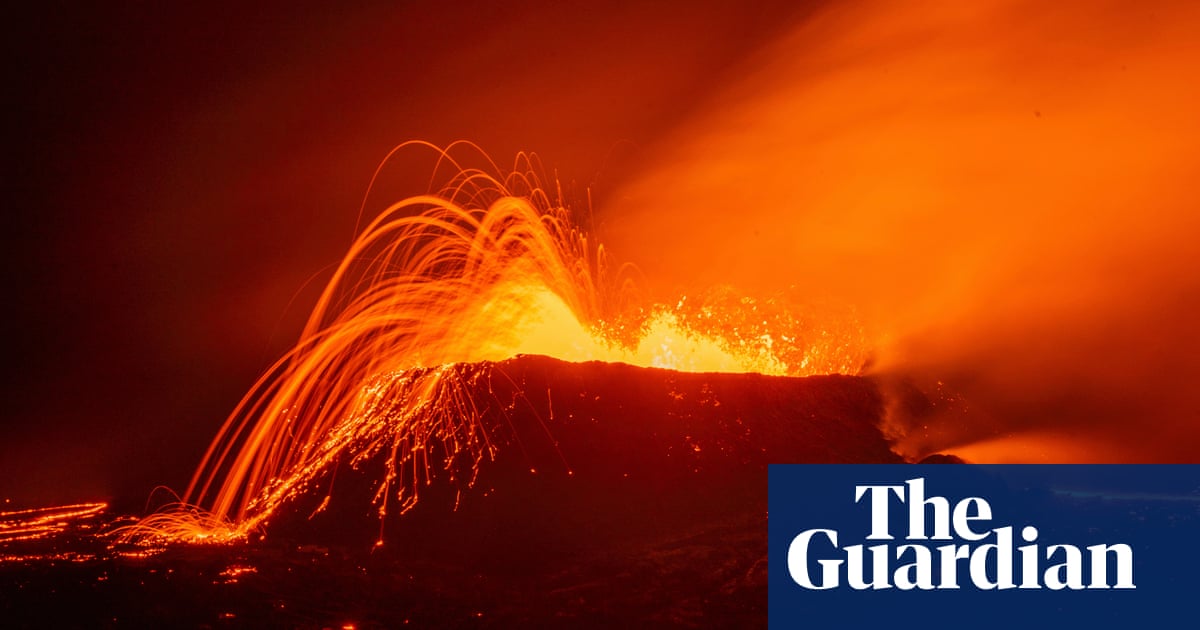
In a week in which former allies in a redividing globe separately commemorated the 80th anniversary of the end of the second world war, the sense of a runaway descent towards a third world war draws ever closer.
The implosion of Pax Americana, the interconnectedness of conflicts, the new willingness to resort to unbridled state-sponsored violence and the irrelevance of the institutions of the rules-based order have all been on brutal display this week. From Kashmir to Khan Younis, Hodeidah, Port Sudan and Kursk, the only sound is of explosions, and the only lesson is that the old rules no longer apply.
Indeed Fiona Hill, the policy analyst and adviser to the UK government on its imminent strategic defence review, argues the third world war has already started, if only we would recognise it.
The fear of a world in which no one, due to science or globalisation, is any longer in control is hardly new: the concept was the title of two Reith lectures, one in 1967 by the social anthropologist Edmund Leach and another in 1999 by the political philosopher Anthony Giddens. But rarely has been it so clear that the rules-based world order created in 1945 is in headlong retreat.
The former Labour foreign secretary David Miliband put it well this week at Chatham House, saying: “I know that people always say the world is changing, but this feels like a moment of genuine geopolitical flux, at least as significant as 1989-90 when the world transitioned from the cold war to a unipolar moment, and for me the Trump administration is both symptom and cause of the changes under way.
“The problem is that it’s much more clear what we are inflecting from – a world in which the US was the anchor of the global system – but it’s not clear what we’re inflecting to. I know there’s a lot of talk about the idea of a multipolar world reflecting a redistribution of the balance of power, but I find that concept conveying too much stability, too much security.”
His one-time mentor Tony Blair, in a talk in California, argued: “Everyone has been shaken out of their comfort zone. The noise you are hearing from the political undergrowth is the frantic foraging for options. People are rethinking their position in the world and their relationships. There is no doubt at all this is a major shock. This is the most significant geostrategic event I can remember in terms of America and the world.”
For the former US secretary of state Antony Blinken, Donald Trump’s indifference to alienating allies is an act of vandalism. He said diplomats around the world were asking: “What the fuck is going on?”
Blinken said America had spent 80 years building up trust, strong economic partnerships and military and political alliances, and if that was then taken down in a matter of 100 days it would be incredibly hard to rebuild.
“It means countries look for ways to work around us, to work together but without the US,” he said. “The possibility that what will be said today will be reversed tomorrow, and will be reversed again, means they simply cannot count on us. Joe Biden used to say it is never a good idea to bet against America. The problem we now have is people are no longer betting on America.”
Trampling on the rules
The doleful consequences of America’s withdrawal have been visible all week. It may or may not be a world war but it is a world at war.
In Gaza the world has watched as a blockade on food, aid and medical supplies, in defiance of binding orders by the international court of justice (ICJ), has now entered into its third month. Israel, in search of security, has in the past month bombed Yemen, Lebanon, Syria and Gaza. It is daily urging the US to be given permission to bomb Iran.
Trump can hardly complain when Bezalel Smotrich, Israel’s ultra-right finance minister, shared his vision for the Gaza Strip on Tuesday, predicting that within half a year the population of the territory would be confined to just a narrow swathe of land, with the remainder “totally destroyed”. Smotrich was only repeating a version of Trump’s plan to empty Gaza of Palestinians, a plan totally at odds with the ceasefire terms his envoy had negotiated.

In remarks at a “settlements conference”, Smotrich also declared that Israel would “apply sovereignty” in the West Bank within the lifetime of the current government, which is due to expire in October 2026 unless elections are called earlier. “Within a few months, we will be able to declare that we have won. Gaza will be totally destroyed,” Smotrich said. “In another six months, Hamas won’t exist as a functioning entity.”
With Trump silent, it was left to Europe to respond. “It is time for the European Union and the entire international community to wake up,” said the Belgian foreign minister, Maxime Prévot. He denounced the blockade as “an absolute disgrace … It is not acceptable; deliberately cutting off all humanitarian aid, all access to food, healthcare, electricity and water, as a war strategy, is totally unacceptable.”
The French president, Emmanuel Macron, said: “If we condemn Russia for violating Ukrainian sovereignty, we cannot remain silent when it happens in Gaza. Hamas must be fought, yes, but not at the cost of trampling on all the rules.”
He called for a united response by Europe, yet at a foreign affairs meeting in Poland the 27 ministers could not even agree on a joint statement, let alone joint action to suspend its free trade agreement with Israel, a Dutch proposal.
Meanwhile in Port Sudan, the conduit for humanitarian aid into Sudan, Rapid Support Forces drones destroyed infrastructure, just as Israeli bombs have sought to do this week in Hodeidah, the chief entry point for aid into Yemen.
On Monday an effort by the Sudanese government to hold the United Arab Emirates accountable at the ICJ for directing arms to the RSF ended in failure. The UAE, like many other nations, is a signatory to the genocide convention, but it has entered a reservation insisting its compliance with the convention is not subject to ICJ proceedings. The ICJ meekly concluded there was a manifest lack of jurisdiction. Only one judge, Abdulqawi Ahmed Yusuf from Somali, objected.
So the UAE gains kudos of signing the convention without needing to be judged on meeting its obligations. It has been left to the UK foreign secretary, David Lammy, to make a valiant effort to coax the parties to a ceasefire, but so far it has foundered. The US, by contrast, labels RSF leaders as genocidal but does nothing in practical diplomatic terms.
In Kashmir, where two nuclear-armed states are firing rockets at one another’s aircraft, there is a conspicuous absence of American interest. The US has no ambassador in India or Pakistan and no senior state department official appointed. The conflict is not making waves in US media, and Trump’s initial response was “it’s a shame” and that “if you think about it they have been fighting for many, many decades, and centuries, actually”.

In previous disputes between India and Pakistan it took a decisive US intervention to help calm both sides. In July 1999 in Washington, Bill Clinton personally browbeat Pakistan’s then leader, Nawaz Sharif, into retreat in what one official called the most important meeting with a foreign leader of Clinton’s presidency.
The former US secretary of state Mike Pompeo revealed in his memoir how close the two sides came in February 2019 to a nuclear conflagration, something he frantically helped stop from a secure hotel room on a visit to Hanoi. Unnervingly, India is no longer framing the issue as terrorism but as a state-on-state dispute by saying the underlying issue is Pakistan acting as a shield for terrorism.
A decent betrayal
These conflicts may be disconnected save the common thread of absent US leadership and permanent upheaval. But in Ukraine the structural elements of the world war come together, Hill argues. The scale of the death toll may be different to the second world war, but according to the UK military this week Russia has suffered 900,000 casualties, far in excess of its losses during previous wars in Chechyna and Afghanistan.
Moreover, the wars are now, in her words, “system-changing conflicts with multivector loads of countries involved”. Chinese-flagged trawlers with Russians onboard rupturing undersea cables in the Baltic Sea is only one part of Vladimir Putin’s global war.
China, North Korea and Iran are all supporting Russia, some in more material ways such as building drone factories or supplying soldiers. A host of other countries have been happy to keep Russia economically afloat in ways that make their neutrality contestable. India, with which the UK has completed a free trade deal this week, has bought €112bn of oil from Russia since the war started, and also bought Russian arms.
The conflict has been presented by Russia and its allies as a war about American hegemony. Trump clearly had a plan to extricate the US from the line of fire and to put relations with Russia on a different footing, a desire he has nursed since the 1980s. Trump sees the world in similar terms to Putin – a handful of sovereign powers dividing up land into spheres of influence. His dream is to re-enact Yalta 1945 alongside Putin and possibly Xi Jinping, with Europe an onlooker and Ukraine dismembered. But organising a decent betrayal has proved more difficult than expected.
In the White House, Trump famously told Volodymyr Zelenskyy: “You have to be thankful. You don’t have the cards.” But Trump overplayed the cards he had, throwing many of them away with his self-destructive tariff war. And it emerged that Zelenskyy did in fact have a few cards left, deploying them skilfully by offering a 30-day ceasefire, a minerals deal with the US, and focusing on Ukraine’s military value to western security.

The intimate photo of Trump and Zelenskyy in conclave at the funeral of the pope (a picture taken by Zelenskyy’s chief of staff, Andriy Yermak) reeked of reconciliation yet flattered Trump’s ego. A change in mood in Washington is now discernible. Even JD Vance, the vice-president, once agitator-in-chief against Zelenskyy, this week admitted Russia was “asking for too much” and said Europe and the US were “on the same team”.
Europe’s leaders would dearly welcome that, but there is now a clarity across Europe, and not just in Paris, that regardless of Vance’s reassurance, Europe has to have the capability to operate autonomously of the US. Trump is self-evidently not reliable, and his benign assessment of Putin’s intentions is not shared.
Planning for a European reassurance force in Ukraine is under way, as is planning for a potential Russian attack on Europe. Since February, France and the UK, through a combined joint expeditionary force, have formed the nucleus of that planning, but this has broadened, with new political leadership increasingly coming from four members of the Weimar+ group: Poland, France, Germany and the UK.
In a speech marking VE Day, the German president, Frank-Walter Steinmeier, explained the double necessity for Europe to be prepared for war. Russia’s war of aggression had shattered the European security order, with the imperial delusion that the war in Ukraine could be conflated with the great patriotic war. Then he added: “The fact that now even the United States, who did so much to create and shape this order, is turning its back on it is a shock on an entirely new scale. That is why I speak of a double epochal shift – Russia’s war of aggression and the US break with its values – that is what marks the end of this long 20th century.”
Europe, he insisted, must decide what comes next.

 3 hours ago
6
3 hours ago
6













































